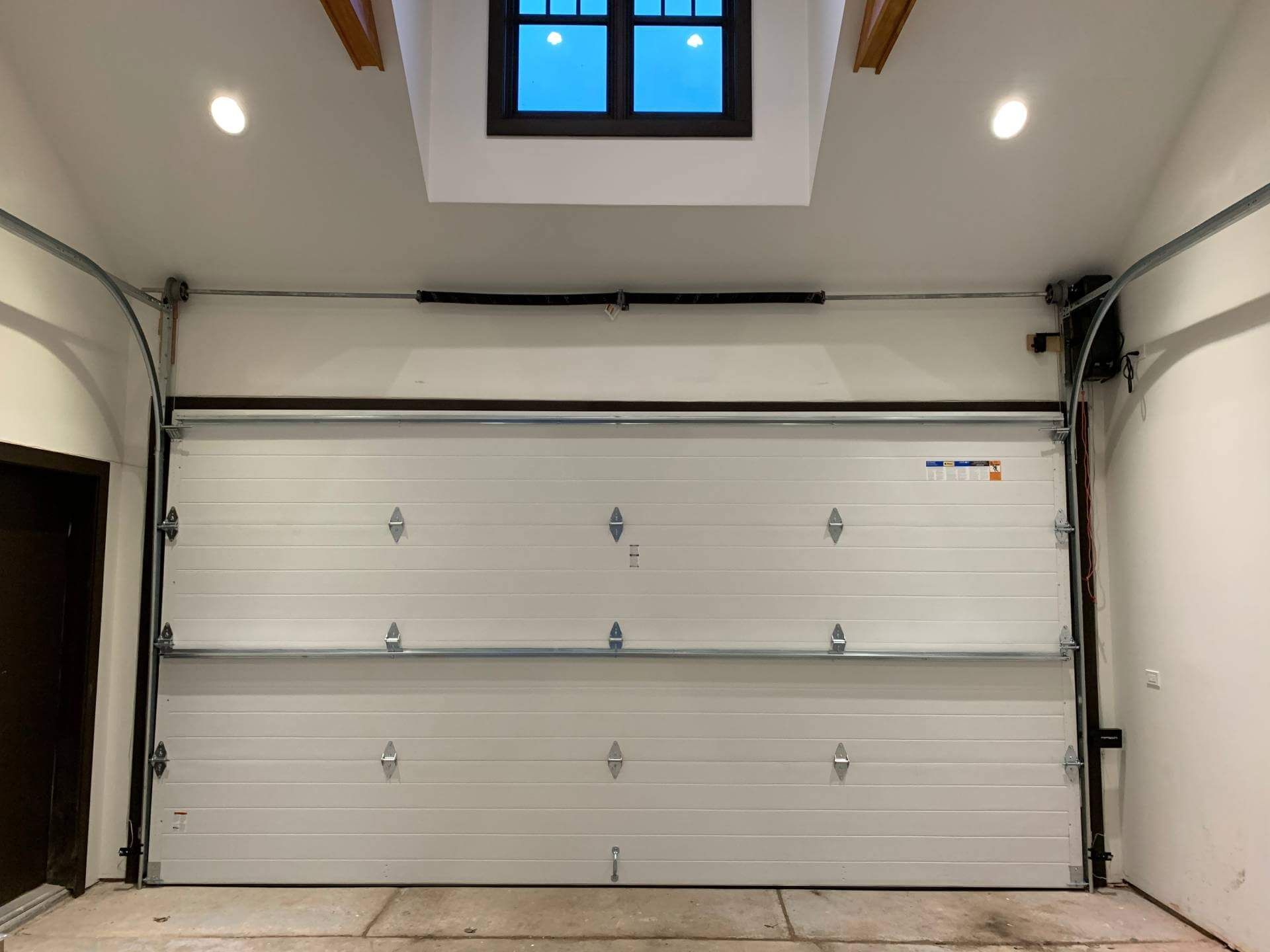Have a question or are you in need of service? Reach out online or give us a call!

Posted by Four Seasons on November 25, 2025
For Chicago homeowners, few home improvements deliver comfort and efficiency like upgrading to an insulated garage door. With winters that routinely drop below freezing, and wind chills that cut even deeper, your garage plays a bigger role in home energy performance than you might expect.
Whether you use your garage as a workshop, have living space located above it, or simply want lower heating bills, an insulated garage door can make a noticeable difference. This guide breaks down what insulation actually does, the best R-value for a garage door in Illinois, the cost of an insulated garage door in Chicago, and whether the investment pays off long-term.
What R-Value Means, and Why It Matters in Illinois
R-value is a measurement of how well a material resists heat transfer. The higher the R-value, the better the insulation performs.
For garage doors, R-values typically range from:
- R-8 to R-12: Basic insulated doors
- R-13 to R-18: Mid-range, high-performance options
- R-18+: Premium insulation, often polyurethane-filled
In Illinois, especially the northern region, the climate demands higher insulation performance than many other states. Chicago winters are long, windy, and harsh, meaning heat loss through a poorly insulated garage door is not just possible, it’s guaranteed.
So what’s the best R-value for a garage door in Illinois? For most Chicago homes, R-13 to R-18 offers the best balance of cost, comfort, and energy savings. Homes with finished rooms above the garage may benefit from R-18+ for maximum temperature control.
How Insulated Garage Doors Impact Chicago Heating Bills
If your garage is attached, heat loss through the garage can affect your entire home. Cold air infiltrates shared walls, the entry door to the house, and even the floors of rooms above the garage.
An insulated garage door helps by:
- Reducing heat loss: Less strain on your furnace, especially during subzero weeks
- Stabilizing temperatures: Garages with insulated doors often stay 10–20°F warmer than those with non-insulated doors
- Preventing drafts in adjacent rooms: A common problem in Chicago’s older bungalows and two-flats
At today’s energy rates, reducing furnace runtime, even by a small percentage, can save homeowners hundreds of dollars per winter. Over the lifespan of a garage door (20–30 years), the savings often outweigh the initial investment.
Non-Energy Benefits That Matter in Chicago Homes
1. Noise Reduction in a City That Never Sleeps
Insulated garage doors naturally dampen outside noise. That’s a major advantage if you live near:
- CTA “L” train lines
- Busy intersections
- Expressways
- O’Hare or Midway flight paths
Polyurethane insulation especially provides excellent sound absorption, ideal for homeowners who use their garages as gyms, workshops, or hobby spaces.
2. Increased Durability Against Harsh Weather
Chicago gets everything from hail to lake-effect snow to freeze-thaw cycles. Insulated garage doors hold up better because:
- They’re built with heavier-gauge steel
- The insulation adds structural rigidity
- They resist dents, warping, and ice damage
This often means fewer repairs over the lifespan of the door.
3. A More Comfortable Garage, Year-Round
Whether you’re storing belongings, working on projects, or using the garage as an entry zone, insulation helps create a more stable and usable space. You’ll also experience:
- Less condensation
- Reduced risk of frozen door tracks
- More consistent temperatures in rooms that share walls with the garage
Cost of an Insulated Garage Door in Chicago
The cost of an insulated garage door in Chicago varies based on material, R-value, and door style. On average:
- Basic insulated steel door (R-8 to R-12):
$1,100–$1,600 installed
- Mid-range polyurethane door (R-13 to R-18):
$1,600–$2,500 installed
- Premium high-insulation or custom doors (R-18+):
$2,500–$4,500+ installed
Although insulated doors cost more upfront, most homeowners see the benefit in reduced heating bills, increased home comfort, and longer door lifespan.
Is an Insulated Garage Door Worth It in Chicago?
For the vast majority of Chicago homeowners, yes, especially if the garage is attached or has living space above it. The combination of energy savings, greater comfort, noise reduction, and durability make insulated garage doors one of the most worthwhile upgrades for Midwest weather.
A quality insulated door doesn’t just keep the cold out. It protects your home, equipment, and budget from Chicago’s brutal winter conditions. If you’re considering an upgrade, Four Seasons Garage Doors can help you choose the right insulated model and provide expert installation. Contact our team today by calling 630-425-4588 or scheduling an appointment online to get started.
FAQ: Insulated Garage Doors in Chicago
1. What’s the best R-value for a garage door in Illinois?
Most homes benefit from R-13 to R-18, while homes with rooms above the garage may prefer R-18+ for better temperature stability.
2. How much does an insulated garage door cost in Chicago?
Homeowners can expect to spend $1,100 to $4,500+, depending on insulation level, materials, and door size.
3. Will an insulated garage door really lower my heating bills?
Yes. An insulated door reduces heat loss, which lowers furnace usage, especially during prolonged cold spells.
4. Is it worth upgrading if my garage isn’t heated?
Even unheated garages stay 10–20°F warmer with insulation, which improves comfort and reduces cold transfer into the home.
5. Does insulation also help in the summer?
Absolutely. Insulated doors help block outdoor heat, preventing your garage from becoming an oven during hot Illinois summers.
Request Service
Contact Form
"*" indicates required fields